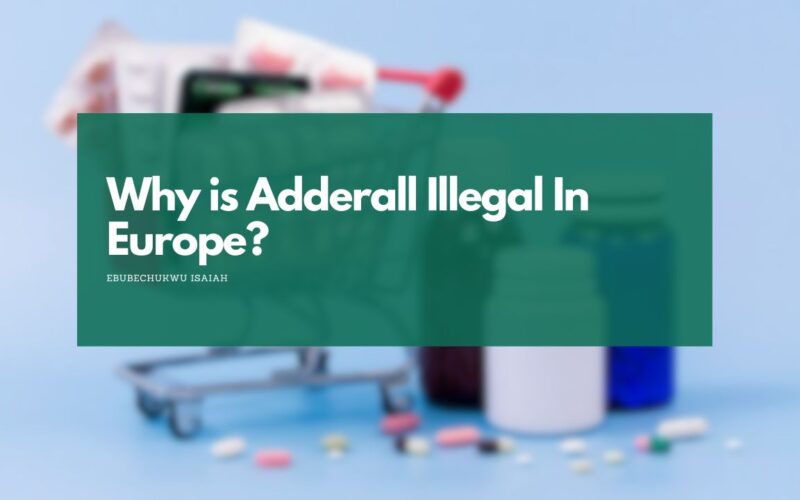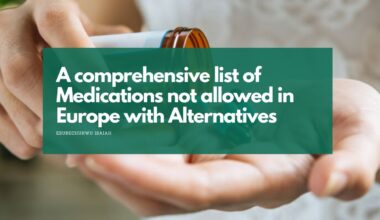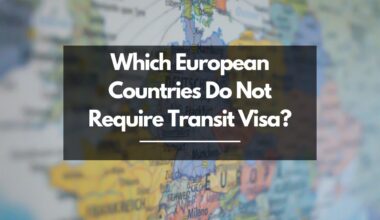As an Amazon Associate, I earn a small commission from qualifying purchases. Learn more about this.
Packing for my trip to Europe, I stumbled upon a forum discussing travel essentials. ‘Don’t bring Adderall; it’s illegal!’ one comment read. This struck me as odd. Why was a drug that’s so commonly prescribed in the States prohibited in Europe?
So I did my research, and here’s what I learned.
Why is Adderall Illegal In Europe?
Ever since that conversation about Adderall with my friend, I’ve been on a quest for answers. Why is it that this medication, common as morning coffee in some parts of the world, is illegal in Europe?
Well, my friends, it turns out, the reasons are quite compelling.
Firstly, let’s talk about the substance itself. Adderall, known to the science community as a combination of amphetamine salts, is classified as a psychostimulant.
Now, while it’s famed for improving concentration and focus—something many students and professionals might swear by—it’s also associated with a high potential for abuse and addiction. Europe’s health regulators have a firm stance on such substances.
They’re all about the well-being of the masses, and if there’s even a hint of public health risk, they’d rather keep it at bay. This cautious approach prioritizes the collective health over the benefits a few might reap.
Moreover, the European medical community follows a different philosophy concerning the treatment of conditions like ADHD, which Adderall often addresses.
They’re big on behavioral therapies, you see, preferring to tackle issues from the root rather than prescribing pills right off the bat.
It’s like learning to weed out the garden rather than just cutting the tops off and letting them grow back. They believe in holistic treatment, addressing lifestyle, diet, and mental health rather than relying solely on medications.
But wait, it’s not like Europe is a “no-medication land.” They do have alternatives.
Medications like Ritalin or Concerta, which contain methylphenidate, are legal and commonly prescribed. These drugs have a similar effect to Adderall but are considered to have a lower risk of dependence and abuse, which gets the nod from European health watchdogs.
Are there any exceptions to the use of Adderall in Europe?
I mean, there’s always a “but” somewhere, right? So, I did a bit more digging, and here’s the scoop.

The straightforward answer is: Europe’s stance on Adderall is pretty rigid, but—and here’s that “but”—there are some very tight, narrow exceptions, though they’re not what you might expect.
These exceptions aren’t so much about the drug itself but more about the process of getting permission for medications that are otherwise not available or legal in the European market. This is known as “named patient programs.”
Here’s how it works: a doctor in Europe decides that their patient needs a specific medication, like Adderall, that’s not normally available in their country.
The doctor has to make a strong case that this is the absolute best treatment option for their patient and that other available treatments won’t do the job.
It’s not about preference; it’s about necessity. Then, they apply for the right to import the drug on a “named patient” basis, which means it’s only for that specific patient with their specific needs.
Believe me when I say, it’s not a common occurrence and requires jumping through a whole series of regulatory hoops. And, of course, there’s no guarantee the authorities will give the green light.
Now, you might be wondering about tourists or students coming from the States or other places where Adderall is legal. This is a grey zone.
If you’re traveling to Europe and have a prescription for Adderall, you can’t just waltz into a European pharmacy and get a refill.
But, you might be allowed to bring a small, personal supply in its original packaging, along with your prescription and a note from your doctor—though you should absolutely check the specific regulations of the country you’re visiting before you travel. Remember, rules can vary big time from one country to another in Europe.
What are the major alternatives to Adderall in Europe?
Now, realizing that getting Adderall in Europe is akin to finding a needle in a haystack, I couldn’t help but wonder: what do people here use instead?
There’s got to be alternatives, right?
Well, turns out, Europe’s got a different set of tools in its kit to help those needing a boost in concentration and mental clarity.
First up on the list is Methylphenidate.
Known by brand names like Ritalin or Concerta, it’s one of the go-to medications prescribed across Europe for ADHD.
Similar to Adderall, it helps improve focus and attention, but with a different chemical makeup that European health professionals feel more comfortable with, given its lower potential for abuse.
Another notable mention is Atomoxetine, trading under the name Strattera. This one’s interesting because it’s not a stimulant. Yep, you heard that right.
It helps with attention and impulsivity issues but without the “upper” effect that drugs like Adderall can have.
It’s more about steady, long-term improvements in attention and behavior, rather than the instant “kick” some might expect from a stimulant.
There’s also Modafinil, branded as Provigil among others, which is used in certain cases. It’s known as a “wakefulness-promoting agent” and is often used to treat narcolepsy. Some doctors prescribe it for ADHD, though it’s not the standard go-to for this purpose.
Let’s lay this out simply:
| Drug | Common Brand Names | Key Benefits |
|---|---|---|
| Methylphenidate | Ritalin, Concerta | Improves focus, less potential for abuse compared to Adderall |
| Atomoxetine | Strattera | Non-stimulant, offers steady, long-term attention improvement |
| Modafinil | Provigil | Promotes wakefulness, sometimes used for ADHD |
Now, beyond medications, don’t forget that European healthcare often emphasizes lifestyle changes and behavioral therapies. It’s not just about popping a pill; it’s about holistic health management—think diet adjustments, exercise, counseling, and practical strategies for managing symptoms.
So, for anyone in Europe missing their Adderall, don’t worry, you’re not left in the lurch. There are alternatives here, albeit with a different approach
Conclusion
The status of Adderall in Europe is a vivid reminder of how varied medical and cultural perspectives can be. While it’s a go-to treatment in the U.S., in Europe, the risks associated with its active ingredients have led to a more cautious stance. It’s always fascinating, and important, to see how different regions weigh benefits against potential hazards, especially when it comes to health.







